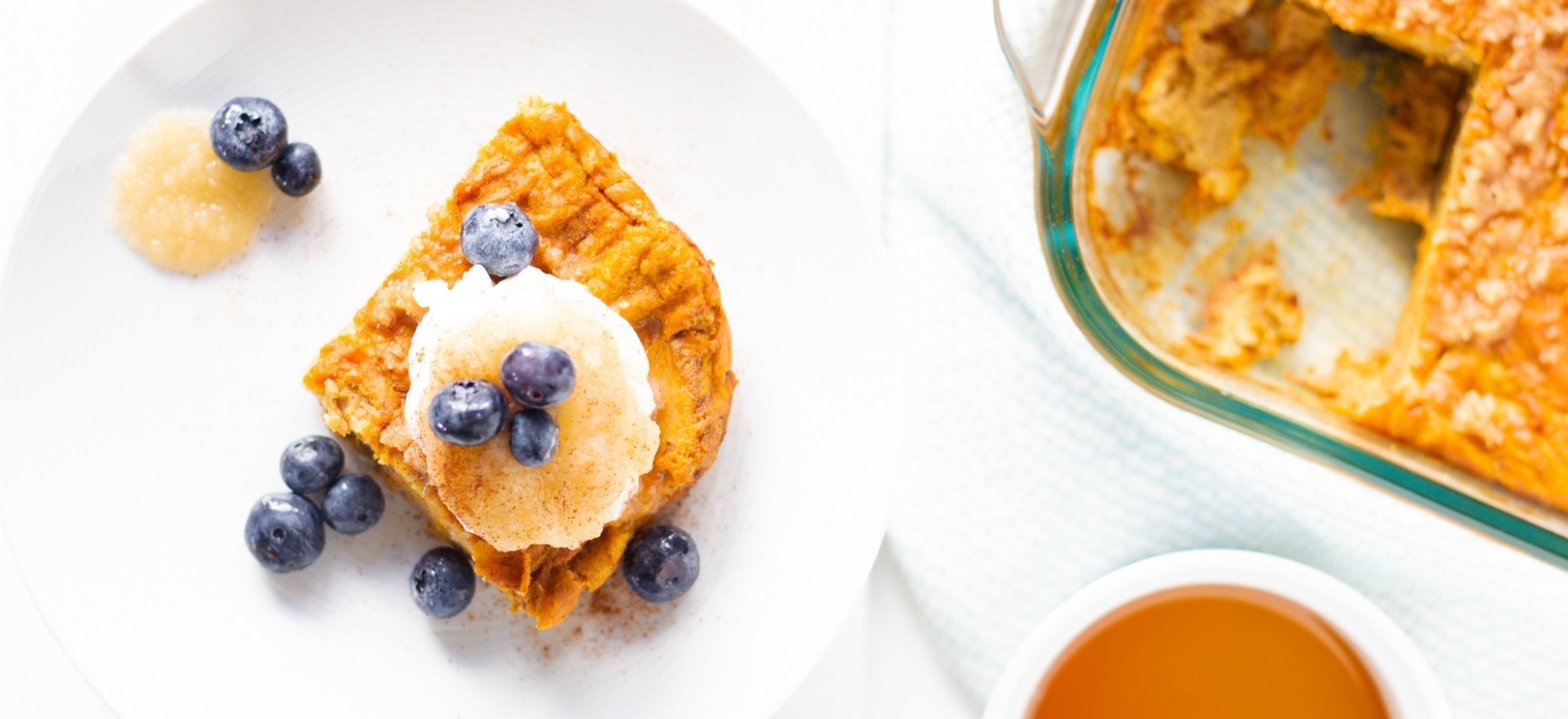

-
1Hr Total Time
-
15M Prep Time
-
13 Ingredients
-
6 Servings
Prep this dish the evening before and toss in the oven the next morning for a breakfast or brunch dish the whole family will enjoy!
This recipe was developed for the Egg Nutrition Center by Egg Enthusiast Stacey Mattinson, RDN.
Stacey Mattinson, RDN
- Casserole
Directions
Generously butter a 9×13 casserole dish.
Cut bread slices vertically into 1″ thick strips. Layer along the bottom of the casserole dish. Once the bottom of the casserole dish is covered, place the remaining bread strips on top of the bottom layer perpendicularly.
Whisk together eggs, brown sugar, vanilla, cinnamon, pumpkin pie spice, and salt in a large bowl until well-combined. Whisk in the milk and pumpkin puree and mix until smooth.
Pour egg mixture on top of bread slices evenly, making sure all bread slices have been coated. It’s ok for some of the egg mixture to “pool” in some spots – it’s better to have more egg mixture than to have uncoated bread slices! Cover and refrigerate overnight.
In the morning, preheat oven to 350°F and place the rack in the center of the oven.
Prepare streusel topping.
Remove plastic wrap from the casserole dish. Using a spoon, gently push bread slices into the custard, then sprinkle on the streusel topping.
Place casserole dish in the oven and bake for 45 minutes until top is puffed. Serve warm. Enjoy!
Ingredients
- 1 Tbsp. butter, softened
- 8-9 slices whole wheat bread
- 6 large eggs
- 3 Tbsp. brown sugar
- 2 tsp. vanilla extract
- 1/4 tsp. salt
- 1 cup 100% pure pumpkin puree
- 2 cups low-fat milk
- Streusel Topping
Directions
While the oven is preheating, prepare streusel topping by tossing together brown sugar, flour, cinnamon, and nutmeg. Work in the chilled butter cubes with your fingers until the mixture is crumbly.
Ingredients
- 3 Tbsp. brown sugar
- 1 Tbsp. flour
- 1/2 tsp. ground cinnamon
- 1/4 tsp. nutmeg
- 1/2 tsp. chilled butter, cubed
Per serving:
- Calories 300
- Total Fat 9 g
- Saturated Fat 4 g
- Cholesterol 195 mg
- Polyunsaturated Fat 1.5 g
- Monounsaturated Fat 3 g
- Sodium 380 mg
- Carbohydrates 39 g
- Sugar 21 g
- Dietary Fiber 2 g
- Protein 14 g
- Vitamin A 360 mcg
- Calcium 220 mg
- Iron 2.7 mg
- Vitamin D 1 mcg
- Folate 45 µg
- Choline 170 mg
- Potassium 310 mg
To ensure food safety, eggs should be cooked until both the yolk and the white are firm. Consuming raw or undercooked eggs may increase your risk of foodborne illness, especially for those with certain medical conditions. For recipes that call for eggs that are raw or undercooked when the dish is served, use either pasteurized shell eggs that have been treated to destroy Salmonella, or use pasteurized egg products.





 Grains
Grains Vegetables
Vegetables Fruit
Fruit Dairy
Dairy Protein
Protein